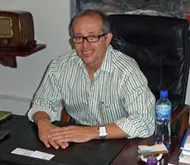The sale of private television station Telenica Channel 8, one of Nicaragua’s most popular broadcasters, has sparked immediate controversy. Carlos Briceño, left, who previously owned the station, recently confirmed that he had sold the station but said that a confidential contract has forbid him from revealing the name of the buyers or the figures of the transaction. Local news reports have alleged that the buyers were family members of President Daniel Ortega.
The Nicaraguan press has alleged that the new owners are directly linked to Ortega and the economic interests of the ruling Sandinista National Liberation Front (FSLN) party. While no administration official has made public comments on the deal, pro-Ortega television host Alberto Mora acknowledged on Tuesday that he was authorized to speak on behalf of the new proprietors but didn’t give any details about the deal. His morning show on TV Channel 4 is run by Ortega’s sons and, according to some reports, owned by the presidential family.
Local news reports have speculated that Briceño received US$10 million for the deal.
Local reporters told CPJ they are concerned about the implications of the sale for freedom of expression, saying that programs critical of the Ortega administration may be forced off the air. Journalists and free press advocates are particularly worried about the future of Carlos Fernando Chamorro, Nicaragua’s most influential journalist and a harsh critic of Ortega.
According to Mora, Chamorro, who hosts the television news programs “Esta Semana” (This Week) and “Esta Noche” (This Night) on Telenica, can continue with his shows on Channel 8. “He can say what he wants,” said Mora, according to a report published in the Managua-based daily El Nuevo Diario. “We will respect every word of his contract, and if he wants to renew it, he will just have to come by and sign it.”
On Wednesday, Chamorro said during his broadcast that he and his team have long respected freedom of expression and democracy but that in doing so “we have been insulted, harassed, censored, and persecuted by President Ortega.” In 2008, Chamorro was investigated for alleged money laundering. After and international outcry, the criminal inquiry was dropped a year ago.
Chamorro said that the Nicaraguan government’s credibility crisis has led him to believe that Mora’s words can not be taken seriously. He also said that “we will never legitimate a sham in this television channel now controlled by Ortega.”
Nicaraguan journalists said that the alleged purchase of Telenica fits perfectly on Ortega’s strategy of restricting critical coverage while minimizing the influence of the private press as the president flirts with a reelection bid. In October, the Supreme Court overturned constitutional prohibitions on consecutive presidential re-election and service of more than two terms, clearing the way for Ortega to run again in 2011.
According to a recent CPJ special report, Ortega, who has called the independent news media enemies of the Nicaraguan people, has moved aggressively to obstruct them and minimize their influence. The government uses the official media apparatus—Channel 4, radio station Nueva Radio Ya, and news Web site El 19—to conduct character attacks against critics. These efforts are supported by e-mail news services—called Nicaragua Triunfa and Nicaragua, cómo vamos—and the FSLN-owned Radio Sandino.
